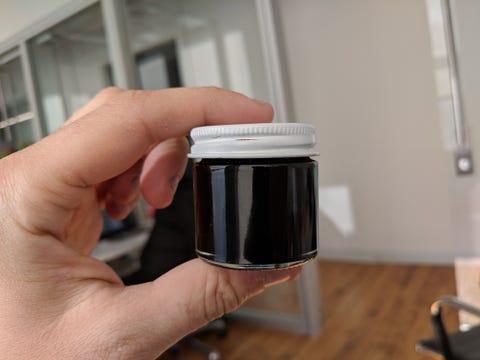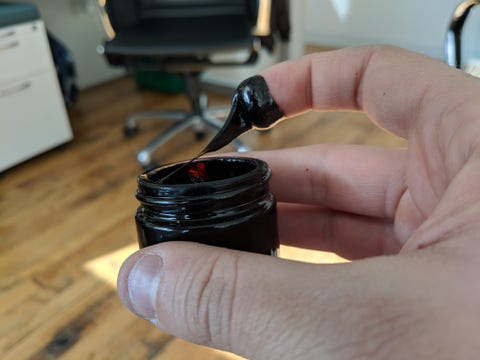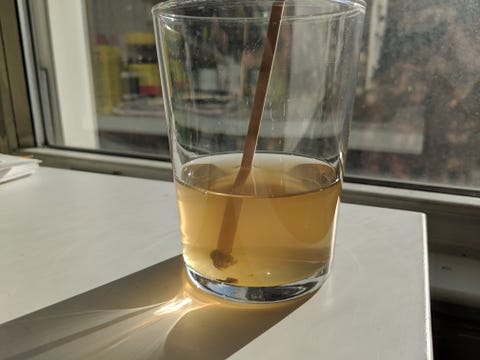There’s nothing actually appealing about the mysterious Himalayan goop I found in my local dispensary, but I couldn’t resist the temptation to give it a try.
I was browsing around my favorite CBD and kratom spot, Hidden Hemp, when I spotted several jars of brown gunk sitting innocuously behind a glass display case. It’s called shilajit. It’s sticky like old caramel, smells like rubber, looks like tar, and frankly doesn’t taste much better. Known traditionally as “the destroyer of weakness,” this thick adaptogenic, ayurvedic resin is said to contain more than 84 minerals, support the immune system, enhance energy and stamina, boost testosterone in men, and reduce inflammatory response.
This bizarre black substance is touted as the kind of cure-all that gets guys like me (you know, guys who like try weird shit in the name of self-discovery) all hot and bothered. After getting my hands on some shilajit, I devoted an entire month to experiencing the supposed effects of this mystery resin. I didn’t have any particular goals in mind for my trial—no races I was training for, or plans to lose weight or build muscle—I just wanted to see what would happen.
What Is Shilajit?
The supplement comes in a tiny glass bottle with a comically-small spoon that measures a pea-sized serving of the stuff, which means it can last for months if taken correctly.

Jeremy Glass
As the marketers will tell you, shilajit comes from the Himalayas—specifically from the rich environment created through organic materials caught up in the Earth’s tectonic shifts over time. “These decaying plants were gradually transformed into humus, a rich organic mass that is food for new plant life, and eventually, due to microbial action and the tremendous pressure from the weight of the mountains, the humus was transformed into a dense, mineral-rich substance—shilajit,” says Calvin Bond, representative for HANAH, a company that makes products, including the upcoming Shilajit+, using Ayurvedic ingredients.
The guy at the shop was frankly obsessed with shilajit, and he told me he used to take it every single day before working out. He advised me that I should take it every day so it can “build up in my system,” and insists it will give me an insane amount of energy.
“Shilajit has strong cognitive and memory benefits,” Elizabeth Dorow, an herbalist, told me. “Research is beginning to support shilajit’s potential to prevent several diseases, with a primary application in the prevention of Alzheimer’s disease. In addition to its cognitive benefits, a study by the Asian Pacific Journal of Tropical Biomedicine states that “shilajit, an Ayurvedic formulation, is safe for long term use as a dietary supplement for a number of disorders like iron deficiency anaemia.”

Jeremy Glass
However, much of the clinical research conducted on shilajit has been done on rats and any benefits that emerge in rat study often do not replicate in human studies. In short, more research is needed to prove the benefits of shilajit in people like me.
But it’s not just purveyors of this stuff who believe in the power of shilajit. “Bodybuilders actually love it and [take it] to help with physical endurance and hypertrophy because it can relieve fatigue,” said biohacker and wellness advocate Fiona Gilbert, an American College of Sports Medicine-certified exercise physiologist. Gilbert actually prescribes shilajit as a supplement for her clients, and claims that she has seen the stuff work firsthand.
“It has been on the market mainly as a male enhancer,” Gilbert continued, “but I recommend it to men and women over the age of 35 to help with balancing their testosterone levels, general energy, libido, mental acuity, adrenal health.”
What It’s Like to Take Shilajit
On that very first day I got my shilajit, I went home and mixed an approximately pea-sized amount of the dark matter into a glass of warm water and watched as it turned to the color of black tea.
Anyone who’s drank shilajit before will agree that it tastes bad—disgusting, actually. Bitter, salty, smoky, and tinged with an earthy tang that makes me wanna wretch just thinking about it. I didn’t feel anything my first, second, or even third day. I dissolved the substance in warm water every morning, try to down it all, then… nothing.

Jeremy Glass
Until day four. (I should mention that I am 100 percent not one of those people who believe in holistic cure-alls and will actively discourage someone from putting anything in their body that can supposedly make them a better athlete—especially when it isn’t FDA-approved, which shilajit is not).
I took my shilajit and I went to the gym, where I ran my fastest ever treadmill 5k. I wasn’t just quick—I completely shattered my previous record and found myself so full of energy that I actually had to stop myself from running so I could get to my office on time.
Without fail, I took shilajit every day after and almost always feel the rush of energy and excitement that I first had on day four. While I certainly didn’t see myself as “smarter” from taking shilajit, I noticed a definite increase in cognitive ability—specifically in terms of concentration. I felt more level-headed and calm, which gave me more than enough reason to want to continue taking the supplement well after the trial month ended.
“Our personal experiences are fallible especially when it comes to the subjective areas of health.”
“It’s possible that some of the biologically active/nutritive elements in shilajit affected you neurologically and/or metabolically,” research reviewer for Examine.com Wyatt Brown told me. “In a recent human trial, a dose of 500 mg/day (but not 250 mg) seemed to help preserve strength in response to fatiguing muscular exercise. This study was funded by a company that makes a patented shilajit product.”
Brown went on to say that a couple studies specifically increased testosterone levels in infertile men—but there was a caveat.“Researchers can sometimes do sneaky things to produce a positive result in hopes that the company or other companies will recognize their usefulness and fund future research,” he said.
So, a positive study coming from a company that makes whatever is being studied should obviously be taken with a grain of salt. That doesn’t automatically make them false—there’s just a vested interest to show their product in a positive light.
Possible Risks of Taking Shilajit
This stuff is not FDA-approved, which Dorow blames on America’s inability to focus on anything but “artificially derived and harsh chemical compounds.”
Registered dietitian nutritionist and functional foods expert Christy Brissette gives me the helpful advice to avoid being “the guinea pig” when it comes to taking shilajit. She urges that people wait for evidence before taking unproven supplements.
“My main concern with shilajit supplements is they can contain heavy metals and other contaminants,” Brissette said. “In Canada, shilajit isn’t even sold because of high levels of heavy metals in some of the products that were tested.”
Brissette suggests people do their homework before taking supplements, and to look for proof of heavy metal testing and certifications for Good Manufacturing Practices (GMP logo) as well as the Natural Products Association’s TruLabel program, which includes random testing of supplements.

Tanya ConstantineGetty Images
I was impressed enough with how I felt to believe in the validity of shilajit, and to want to continue taking the supplement—but I will do my due diligence to make sure the stuff I buy is sourced sustainably and doesn’t contain anything that will make my teeth rot or nipples fall off.
But my mind might be playing tricks on me. Brown stressed that our mindsets can affect the way we perceive supplements’ effects on our bodies. “Our personal experiences are fallible,” he said, “especially when it comes to the subjective (fatigue, mood, pain, etc.) areas of health. Our thinking can influence how we feel and if we’re excited about a new supplement that we think is going to improve vitality, we can convince ourselves that it worked or the shift in mood from something new and exciting can make us feel better.”
For the record, Brown does see a possible threat when it comes to toxic metals in shilajit and other similar supplements.
“If it contains minerals and decomposed plant matter, it could very well contain toxic metals,” he said. “It’s best to only buy from companies that are certified and regularly checked by credible, independent laboratories.”
As always, do your due diligence and make sure that whatever you’re putting in your body likely isn’t rife with toxic materials. Personally, the potential risks from heavy metals was well worth the boost in stamina and mental clarity. Does that make me Iron Man? Technically, no—but in many ways, yes it does.
Source: Read Full Article
